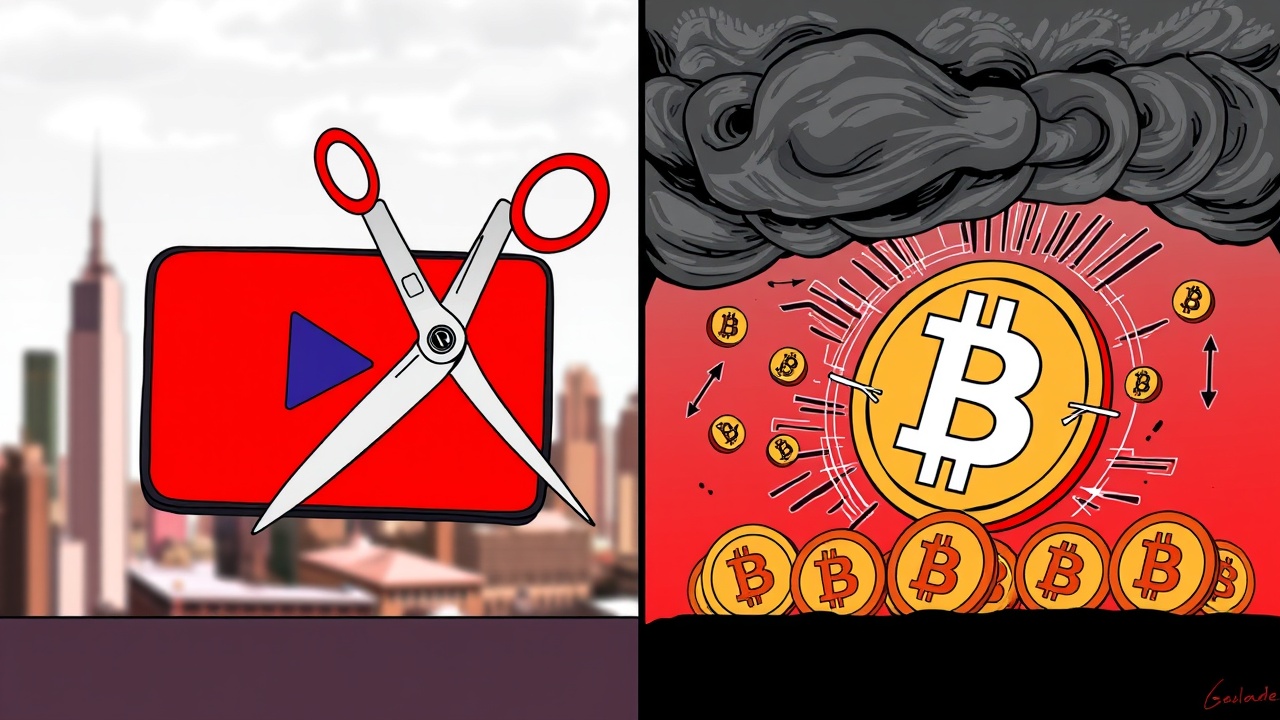Roxom TV’s Shutdown and Implications
Roxom TV, a budding media outlet concentrating on Bitcoin education and culture, faced an unexpected shutdown by YouTube, resulting in the sudden loss of 2,000 subscribers on May 14. Established in November 2024 by crypto entrepreneurs Borja and Helena Martel Seward, Roxom TV quickly built its presence on the platform, but its abrupt removal raises significant questions about content moderation practices at YouTube.
Frustrations Over Content Moderation
The channel’s director of Bitcoin strategy, Alex McShane, expressed his frustrations regarding the lack of clarity from YouTube about the ban. He shared with Cryptonews that the reasons cited in YouTube’s correspondence do not align with their actual content:
“Our transcripts from recent shows we’ve published don’t align with the reasons listed in the emails sent to us by YouTube,”
he commented. The platform flagged Roxom TV for purportedly violating policies related to “harmful and dangerous content.” Following their appeal, the response reaffirmed the ban without further clarification, leading McShane to suspect an automated system had misinterpreted their live political and crypto-related coverage.
“The auto ban likely stemmed from a bot misapprehending our satirical content as endorsements of cryptocurrency scams,”
he speculated, noting that live streams potentially trigger more stringent algorithmic scrutiny.
Despite the ongoing ban, McShane remains optimistic about reinstatement but emphasized the necessity of human engagement in the review process, rather than reliance on automated responses.
Patterns of Content Removal
Roxom TV’s situation echoes a broader pattern seen in December 2019 when YouTube executed a significant crackdown on cryptocurrency-related channels, which included the removals of at least 35 accounts, such as the Bad Crypto Podcast and Cointelegraph’s channel. Many of these channels were reinstated later, suggesting a possible pattern of wrongful flags by YouTube’s algorithm, which heavily relies on machine learning to enforce community guidelines.
In March, YouTube intensified its regulations concerning gambling content, explicitly warning against promoting gambling websites and similar ventures. This tightening of policy raises important discussions about the intersection of crypto and gambling, as both domains can trigger similar algorithmic filters. McShane noted that the warning from YouTube about potential policy violations wasn’t specifically addressed to Roxom TV, highlighting the ambiguity surrounding their channel’s closure.
Challenges for Content Creators
Experts such as Nikki Martinez, who manages content for creators in the crypto space, pointed out that platforms like TikTok and YouTube might misinterpret certain keywords associated with financial content, resulting in automatic restrictions or bans. Creators sometimes face shadowbans when their content contains phrases they might not even perceive as problematic. She suggested that creators should adapt their messaging to avoid terms like “guaranteed income” or “easy money” that are prone to trigger bans, advocating for more nuanced language instead.
Given the stringent environment on centralized platforms, McShane advised content creators in the cryptocurrency field to explore decentralized alternatives, which could offer more freedom from censorship. However, he acknowledged the significant audience that traditional platforms like YouTube and TikTok still command, prompting many to continue using these services while being cautious about the language they use.
Martinez underscored that successful creators can thrive by presenting crypto narratives that are accessible and engaging while remaining compliant with platform regulations. She highlighted the importance of diversifying presence across different channels, recommending building email lists or utilizing dedicated communities on platforms like Telegram and Discord to mitigate risks associated with centralized social media dependency.
Conclusion
In conclusion, amid rising constraints on cryptocurrency content across social platforms, Roxom TV’s experience serves as a poignant reminder of the challenges faced by digital creators navigating the complexities of algorithm-driven moderation. Wendy O, another content creator, advised peers to remain informed about the platforms’ policies and to exercise care with their wording to avoid unwanted repercussions.




